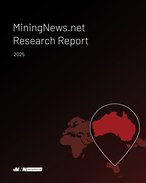This article is 17 years old. Images might not display.
The survey covers 14 employment sectors and more than 100 jobs in Australia and New Zealand's resources and mining sector.
The report found Western Australia and Queensland experienced the biggest salary increases in Australia on the back of the continued boom in the resources and mining sector.
"The majority of employers across all sectors reported increases in salaries of between 3 and 6 percent," said Hays Resources and Mining regional director Ben Hiles.
"Unsurprisingly, the exception was certain skills in high demand, such as in resources and mining where 32 percent of employers increased salaries above 6 percent."
In specific roles, the survey found salary ranges including:
• Exploration Manager: Qld $120,000-155,000; WA $125,000-160,000
• Mine Manager: New South Wales $165,000-220,000; WA $145,000-200,000
• Project Manager: Qld $120,000-160,000; South Australia $115,000-130,000
• Open Pit and Underground Supervisors: WA $100,000-130,000; NSW $90,000-110,000
• Engineering Manager (Industrial Design): WA $220,000-260,000; Qld $180,000-220,000
Hays said given short- to medium-term investment levels, it did not "expect any slowdown in the demand for skills, but we may see an acceptance that there is a finite amount of labour available and projects will be planned accordingly"
Across the Tasman, technical specialists, project managers, specialist tradespeople and intermediate level geologists and engineers are in particular demand.
"New Zealand faces tough competition in a global energy and resources market to secure the services of these professionals," Hays said.
"Many New Zealand candidates are attracted to the highly paid [fly-in, fly-out] positions available in Australia, thus further impacting the skills shortage in New Zealand."
Hays said all this activity and the shortage of skilled candidates had impacted recruitment habits, attitudes and methodologies over the last year.
It cited 64% of its survey respondents which said they would consider sponsoring candidates from overseas, compared to 44% last year.
Also, 80% said they needed to adopt a more flexible approach to staffing.
"Smart employers are reviewing their recruitment process to ensure they attract the best candidates, since it isn't unusual for candidates in high demand areas to receive several employment offers.
"However, they do not always select the role offering the highest salary - future potential, competencies and culture fit are important, and any employer with a rigid and lengthy recruitment process is going to find it very difficult to compete," Hiles said.
"Salary is also not always the most important factor in retention - there is much research to show that how valued staff feel, how they are encouraged to develop, the flexibility surrounding work practices, office environments and community or environmental support are increasingly important. Having said this, employers still need to ensure their salaries are competitive."























